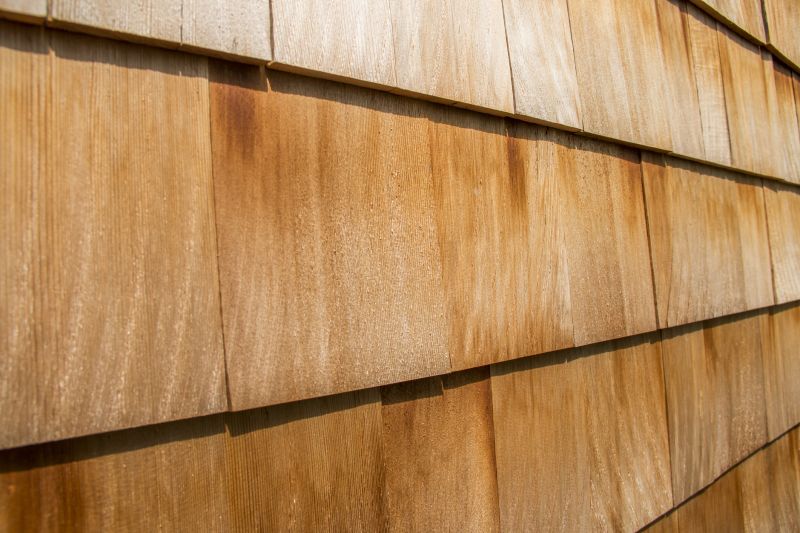Favorite Tools and Materials for Shingle Siding Installations
Learn about the essential products that make shingle siding installation easier and more reliable.
 Shingle siding installation involves a variety of products designed to ensure durability, proper attachment, and a clean finish. Selecting the right tools and materials is essential for achieving a professional-looking result and maintaining the integrity of the siding over time. From foundational accessories to finishing touches, the array of products available caters to different project scopes and preferences.
Shingle siding installation involves a variety of products designed to ensure durability, proper attachment, and a clean finish. Selecting the right tools and materials is essential for achieving a professional-looking result and maintaining the integrity of the siding over time. From foundational accessories to finishing touches, the array of products available caters to different project scopes and preferences.
Top Overall Option
Universal Shingle Installation Kit
This comprehensive kit includes a selection of high-quality fasteners, a durable underlayment, and essential tools designed for shingle siding installation. Its versatility makes it suitable for various siding materials and project sizes, providing a reliable foundation for professional results.
Types of Products For Shingle Siding Installations
Installation Nails
Specialized nails designed for securing shingles firmly while preventing damage or corrosion.
Fastener Guns
Power tools that simplify the process of driving nails or staples into siding materials efficiently.
Underlayment Sheets
Protective layers that provide moisture resistance beneath the shingles, enhancing durability.
Cutting Tools
Specialized snips and saws for precise cutting of shingles and related materials.
Sealants and Caulks
Sealants used to fill gaps and seal around edges for weatherproofing.
Corner Trims
Accessories that provide a finished look at corners and edges of the siding.
Flashing
Metal or plastic strips that direct water away from vulnerable areas.
Siding Adhesives
Strong adhesives formulated for bonding shingles securely to surfaces.
Ladder and Scaffolding
Support equipment for reaching higher areas safely during installation.
Measuring and Marking Tools
Tools like levels, chalk lines, and rulers for accurate placement and alignment.
Protective Gear
Safety equipment such as gloves, goggles, and masks to ensure safe work practices.
Cleaning and Prep Supplies
Materials used to prepare surfaces and clean up after installation.
Vapor Barriers
Materials that prevent moisture from penetrating behind the siding.
Expansion Joints
Components that accommodate movement and prevent cracking or warping.
Popular Choices
Widely used for their corrosion resistance and reliable fastening capabilities.
Hand or power tools that facilitate quick attachment of underlayment and other materials.
Flexible tape that seals joints and edges to prevent water infiltration.
Cost-effective options for finishing corners with a clean appearance.
Sealants formulated to withstand outdoor conditions and maintain adhesion.
Tools designed for precise cutting and trimming of shingles on-site.
Protect hands during handling and installation of siding materials.
Essential for ensuring straight and even siding installation.
Materials that provide an extra layer of moisture protection behind siding.
Tools that allow for precise application of sealants and adhesives.
Reliable ladders equipped with stabilizers and safety locks for high work areas.
Tools and solutions for preparing surfaces before installation.
Components that allow for movement and prevent cracking in siding.
One critical aspect of shingle siding installation is the use of appropriate fasteners and adhesives. These components must be compatible with the material of the shingles and suited to the environmental conditions of the installation site. Properly chosen fasteners help prevent issues like warping, loosening, or water infiltration, which can compromise the siding's performance.
Additionally, specialized tools such as shingle cutters, installation nails, and protective underlayments play a vital role in streamlining the process. Quality underlayments provide an extra layer of moisture resistance, while precise cutting tools ensure clean edges and proper fit. Accessories like corner trims, flashing, and sealants contribute to a finished appearance and help protect vulnerable areas from water intrusion.
Understanding the key considerations when selecting products for shingle siding installation can lead to more efficient work and better results. Factors such as material compatibility, weather resistance, ease of use, and durability should guide purchasing decisions. Carefully evaluating these aspects ensures that the chosen products meet the specific needs of each project, whether it involves residential or commercial applications.
Key Buying Considerations
- Compatibility with the specific type of shingle siding being installed.
- Weather resistance features to withstand outdoor conditions.
- Ease of handling and installation, especially for DIY projects.
- Corrosion and rust resistance for fasteners and metal components.
- Durability and long-term performance of materials.
- Compatibility with existing or planned siding materials.
- Availability of accessories like trims, flashing, and sealants.
- Safety features and ergonomic design of tools.
- Cost-effectiveness relative to project scope and quality.
- Brand reputation and product reviews for reliability.
- Ease of storage and transportation of bulk materials.
- Environmental conditions of the installation site, such as moisture levels.
- Flexibility of materials to accommodate expansion and contraction.
- Compatibility with insulation and vapor barriers if used.
- Warranty or guarantee offered by the manufacturer.
